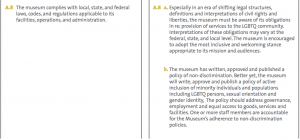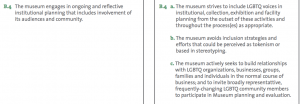Museums have, for many decades now, been sites of learning and exploration for people of all ages, economic classes, and educational levels. The idea of informal learning spaces assisting with civic education of newly arrived Americans has its roots in a Progressive Era ethos of immigrant assimilation, with the accompanying racist and xenophobic undertones one might expect. However, some of the programs provided by settlement houses and other progressive aid organizations had a significant impact on the lives of immigrants eager to learn about their new country and to advance within it.
Regardless of the flawed origins of these programs, the value of civic education that unites all Americans and enables advocacy and enfranchisement is not to be denied. This understanding of the role museums can play in the pursuit of civic engagement is fully realized in programs like New-York Historical Society’s Citizenship Project. This class uses art from New-York Historical’s collection to teach prospective citizens about American History and Civics through art in the collection. The course does not shy away from informing the students about the darker aspects of American History, including Native American removal, the Chinese Exclusion Act, and the Civil War. The Society also hosts naturalization ceremonies for students after they complete the program and pass their citizenship exam.
Of course, for those of us already enfranchised, we don’t have to wait long to exercise our right to vote. There is a midterm election fast approaching on November 6. Aside from the noble causes museums can assist with, like citizenship courses or enhancing student learning by providing material culture to augment in class learning, we know that museums are affected by political decisions every day. From federal funding of the arts and history projects to local budgets supporting field trips, elections matter when it comes to keeping museums open, encouraging new work to be done, and extending access to museums for students and other prospective learners.
This blog encourages you, museum professionals and students alike, to make sure that you make a plan to vote on November 6. The state of Massachusetts, where Tufts is located, has a sample ballot available here to help you prepare for voting and a way to find your polling location here. Other states have also posted their ballots and polling place locators online. Making decisions about who and what will best represent your life and your institutions is an important responsibility that comes with civic education. As John Dewey once noted, “Democracy has to be born anew every generation, and education is its midwife.”

